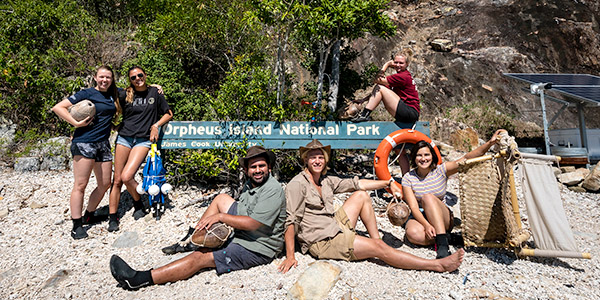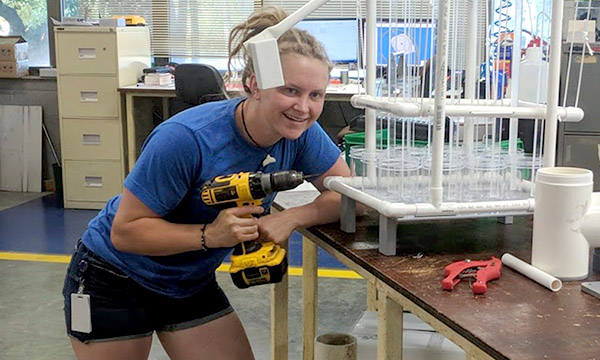Expanding horizons, one adventure at a time
In the MISTI-Australia program, MIT students help conserve the Great Barrier Reef

Left to Right: Amber VanHemel '19, Civil & Environmental Engineering, Concentration: Global Studies and Languages; Madison Pickett '20, Mechanical and Ocean Engineering, Concentration: Climate Change; John Michael Reyes '19, Mechanical and Ocean Engineering; Stephen Rodan '16, Mechanical Engineering alumnus; MISTI-Australia intern; Sierra Rosenzweig '20, Civil & Environmental Engineering, Minor: Management; Zoe Lallas '20, Civil & Environmental Engineering
"As MISTI-Australia extends its program, more MIT students will be able to experience and help protect the Great Barrier Reef."
Traveling to Australia’s vast Great Barrier Reef has always been a dream for Madison Pickett (’20, MechE), and last summer Madi and four other MIT undergraduates had the chance not only to encounter the reef, but to help conserve it.
The five MIT students spent two months in Australia with MISTI-Australia, a growing section of MISTI, the Institute’s flagship international study program. Founded and led by SHASS faculty and staff, MISTI currently sponsors more than 1,000 MIT students annually on cost-neutral internships in 47 countries.
Amber VanHemel (’19, CEE), another student on the Australia project, arrived at MIT in 2015 determined to learn a new language, alongside her major in environmental engineering. During her first-year fall term, she studied Spanish in the Global Studies & Languages (GSL) program, and by the end of the spring term had completed additional HASS courses (“Globalization: The Good, the Bad and the In-Between” and “International Women’s Voices”) wrapping up a humanities concentration in GSL before the start of her sophomore year.
Video courtesy of MISTI; view on YouTube
Journeys and explorations
Both Madi and Amber also took MISTI internship trips during their early years at MIT: Amber to Spain, Madi to Kenya, and both to the Global Teaching Lab in Italy. Their recent MISTI-Australia experience is another example of the two students’ ongoing explorations at MIT. During their in-country months in Australia, Madi and Amber worked with the Australian Institute of Marine Science (AIMS) — the Aussie equivalent of the U.S. National Oceanic and Atmospheric Association (NOAA), focusing primarily on methods to monitor reef conditions.
With the encouragement of their local mentors, they also sought out additional, specialized research projects (including coral coring and genome mapping a predatory starfish) and set up informational meetings with department heads across the AIMS organization.
They learned that the AIMS conservation efforts are now urgent as the onset of climate change is already threatening the life of the reef, which is the largest single structure on Earth made by living organisms. Increased temperatures have led to stress and to population changes in aquatic life that are ravaging the reef’s delicate, symbiotic ecosystem.
One goal of the MISTI contingent was to make monitoring these changes more eco-friendly. In what Amber calls “arts and crafts for engineers,” MIT environmental scientists worked to redesign the cheap, PVC-pipe drifters (instruments used for taking in situ measurements like temperature and salinity) into carbon-neutral alternatives that use waxed balsa wood and woven grasses instead of plastics.

Sierra Rosenzweig '20, Civil & Environmental Engineering, Minor: Management, in the AIMS workshop
"MIT students call their MISTI experiences “transformative.”
Immersive encounters
All five students on the MISTI-Australia trip were scuba certified — either from previous experience or through MIT’s PE program — and were able to have an immersive encounter with the Great Barrier Reef itself.
“The only way to comprehend the damage that’s been done to the reef is to see it for yourself,” says Amber. “Climate change is an issue that’s not going anywhere and its impact on the reef has already been devastating. I’d love to see MISTI-Australia grow and see the collaboration between AIMS, MIT, and James Cook University strengthened.”
While small in comparison to other MISTI programs — which can send forty or more students abroad each year — MISTI-Australia is already having a substantial impact. And as MIT-Australia extends its program, more MIT students will be able to experience and help protect the Great Barrier Reef. Sean Gilbert, Managing Director of MISTI-Australia, explains that, beyond the reef, "the program aims to expand in various Australian cities focusing on disciplines inlcuding AI, energy, fintech, transportation, and healthcare."
Transformative
All of the MISTI country programs are propelled by a vision of training leaders and global citizens. Through a pioneering combination of pre-travel language and cultural studies and their in-country internship experiences, MIT’s MISTI students gain a deeper understanding of cultures around the world, and the capacity to serve on and lead international teams where much innovative science is done. MIT students call their MISTI experiences “transformative.”
As you expand your global perspective,” says Amber, “you adapt, learn, and take away intangible skills. [Through MISTI] I have learned how to interact and talk with many different kinds of people — and just see what’s out there in the world.”
Amber credits MIT’s GSL program for cultivating her drive to widen her worldview: Spanish language studies prepared her for an immersive, fulfilling experience in Madrid for a summer. And in the GSL “International Women’s Voices” class, students conferenced with a class in Cairo several times during the semester to discuss readings.
“That was the coolest thing,” Amber says, “and it really contributed to the driving force that pushes me to seek more international opportunities and experiences.”
Suggested links
MIT Global Studies and Languages
More about the Great Barrier Reef
Prepared by SHASS Communications
Editorial and Design Director: Emily Hiestand
Writer: Alison Lanier
Published 13 May 2019